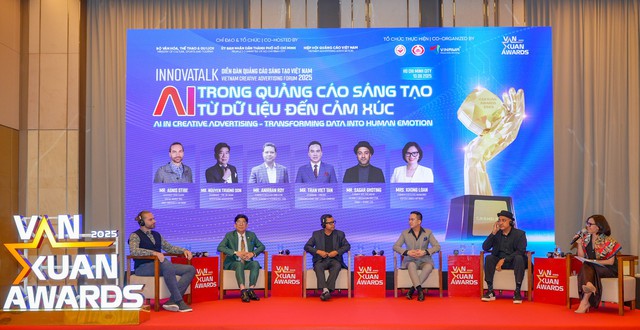 Society
Society


|
| Experts affirmed that AI is a powerful tool driving a new era of creative advertising. Photo tphcm.chinhphu.vn |
HCM CITY – Artificial Intelligence (AI) is no longer a distant concept but a transformative force reshaping industries across the globe, and advertising is no exception.
From data-driven targeting to automated content generation, the technology has brought both promise and uncertainty, prompting Vietnamese experts to reflect on how best to harness AI without losing the human essence of creativity.
Nguyễn Phan Giang, Founder and CEO of Alien Media, emphasised that no matter how advanced technology becomes, it cannot fully replace the human role at the heart of creative work.
He argued that AI should be viewed as an extension of human capability, a tool to accelerate ideas and manage technical processes, while creators remain responsible for vision, strategy and the emotional connections that truly resonate with audiences.
A similar sentiment was echoed by Đỗ Đăng Thường, Executive Creative Director at The Purpose Group, who shared insights from Cannes Lions 2025 under the theme “AI is here, where will creativity go?”.
According to him, AI does not threaten human creators because it operates only on data. “It is people, not algorithms, who give meaning and emotion,” he noted, underscoring that creativity cannot exist without human intuition and storytelling.
For Trần Việt Tân, Vice President of Việt Nam Advertising, AI has introduced entirely new ways of engaging customers, particularly in outdoor advertising.
He highlighted its potential to create interactive, two-way experiences that leave a lasting impression.
“AI can process data, but only humans can breathe soul into it, transforming it into stories that touch the heart. From technology to emotion, from ideas to value, from creativity to national branding—that is the journey that Việt Nam’s creative advertising must pursue,” he said, linking this vision with the mission of the Vạn Xuân Awards to elevate Vietnamese creativity on the global stage.
Nguyễn Trường Sơn, Chairman of the Việt Nam Advertising Association, stressed that the future of advertising lies in blending technological progress with cultural depth.
In his view, AI should serve as a powerful tool to personalise content and optimise performance, while the spirit and identity of Việt Nam remain the decisive factors that create trust and differentiation, “it is the cultural dimension that can turn technology into lasting value,” he affirmed.
International perspectives also enriched the discussion. Sagar Ghoting, Senior Partner at Rhodium Consulting and former Vice President of SRMG-Dubai, advised Vietnamese enterprises and agencies to adopt AI gradually.
He recommended small-scale experiments to draw lessons before expanding adoption across larger campaigns.
From an educational standpoint, Associate Professor Agnis Stibe of RMIT Việt Nam urged a shift from traditional teaching to immersive, multidimensional learning experiences.
He proposed incorporating AI into curricula so students can master digital skills while also cultivating imagination, empathy and critical thinking.
Such an approach, he argued, will produce a new generation of marketers who are both technologically adept and emotionally intelligent.
Khổng Loan, former Deputy Editor-in-Chief of Forbes Việt Nam, framed AI not as a matter of technology but of human choice. “AI is about how people use it to create emotional connections, spread human values and inspire limitless creativity,” she said.
To her, the spirit of the Vạn Xuân Awards lies in recognising individuals and teams who dare to think boldly, innovate differently and drive breakthroughs for a Việt Nam ready to leap forward in the AI era.
What emerged from these perspectives is a consensus that AI, while powerful, cannot define creativity on its own.
It offers unprecedented tools for analysis, efficiency and scale, but advertising remains a profoundly human endeavour—one that requires vision, emotion and cultural authenticity.
For Việt Nam, the challenge is not whether to embrace AI, but how to channel its potential into narratives that honour national identity while competing globally. – VNS




